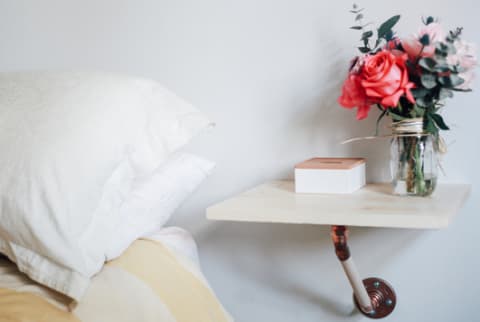Advertisement

We all know that sleep is a basic human need, like eating and drinking. And yet many of us still believe that we can get by on less sleep with no negative consequences.
In fact, obtaining enough quality sleep that's in sync with your body’s natural internal clock is vital for your mental and physical health. Inadequate sleep is linked to conditions like heart disease, kidney disease, high blood pressure, diabetes, stroke, obesity, and depression. Not to mention, sleep is important for personal safety: Poor or too little sleep is associated with an increased risk of injury, serious car crashes, and human error resulting in tragic accidents.
As a Ph.D. diplomate of the American Board of Sleep Medicine since 1984, I've devoted 35 years to the study of human sleep and clinical sleep disorders. And I've found that creating a bedroom conducive to sleep is one of the most important steps to getting the quality rest you need for your mood, physical health, and mental well-being. Here are nine key ways to design a sleep-friendly bedroom:
1. Make your bedroom very dark and quiet.
If where you live is too light and noisy, consider installing black curtains on the windows or wearing an eye mask to block the light from entering your eyes. Turn any clocks with lighted dials away from you.
You can purchase an inexpensive “white noise” sleep sound machine to mask disruptive outside noises. A dark and quiet bedroom is especially crucial to night shift workers who must sleep during the day.
2. Use colors to separate your bedroom from the rest of the home.
Your bedroom should be separated from the rest of your home to maintain a different association and function. For example, the walls should be painted a different, soothing color to reinforce the idea of rest.
3. Declutter your sleep space.
Your bedroom should not be filled with magazines, papers, and electronic gadgets. That's because clutter is often associated with multiple functions, and the idea is to limit the bedroom’s associations and functions, not expand them.
4. Make your bed daily.
It's important to make your bed every day so that you must draw back the covers at bedtime. This ritual also helps to associate the bed with very specific functions—sleep and sex. Do not eat in bed, watch TV in bed, or do any work in bed, as these activities are each associated with wakefulness, not sleep.
5. Invest in a comfortable bed and keep it simple.
Be sure to purchase a high-quality, comfortable bed and pillows; it's an investment you will not regret! Keep your bed sheets, covers, and pillows to a minimum so that you're not constantly pushing them out of the way to get comfortable when trying to sleep. Choose a color for your bedsheets and covers that you find peaceful and calming.
6. Keep pets out of your bed.
Your pets are best left off the bed, so you feel able to move around without being concerned that you might disturb them. The idea is to prioritize your own comfort during sleep. Your pets can still have separate beds in your bedroom if you'd like.
And if you have a human bed partner who is disruptive, consider putting two beds together or investing in a bed that allows for the separate control of each side. This is another investment you will not regret.
7. Use red bulbs to minimize sleep disruptions.
If you get up in the middle of the night for bathroom trips, do not turn on overhead lights. Turning on your overhead lights sends a "wake up" signal to your internal clock. Use red bulbs—red light is basically invisible to our internal clock—in baseboard-level night lights to see your way to and from the bathroom.
8. Keep the bedroom temperature low.
Have you ever noticed that you sleep better during the winter months? We actually achieve more deep, delta sleep in a cool sleeping environment.
You may find you sleep more soundly when you're nude with covers. If you are hot when you go to bed, you'll have a very tough time sleeping. This has to do with your body temperature staying too high for sleep onset to occur. Our body temperature has a 24-hour cycle that parallels the activity-rest cycle. Body temperature rises and peaks during the waking day to produce heat in support of activity and falls during the evening hours to lose heat in preparation for sleep, an energy conservation state. You must literally cool down in order to fall asleep—and a hot bedroom blocks that cool-down process.
9. Get up and leave your bedroom if you can't sleep.
If you're having trouble falling asleep, get up and leave the bedroom to watch TV or read until you're sleepy, and then return to the bedroom. That way, you won't associate your bed with restlessness.
The bottom line: These sleep-friendly adjustments to your bedroom can increase your quality sleep for better mood, physical health, and mental focus.
Related reads:
